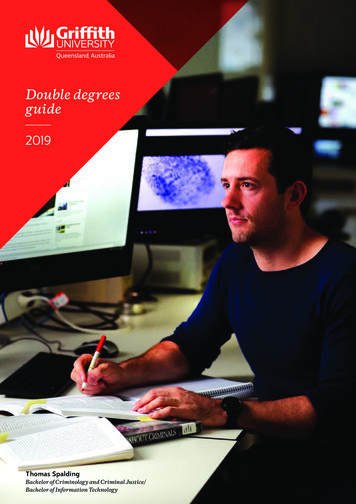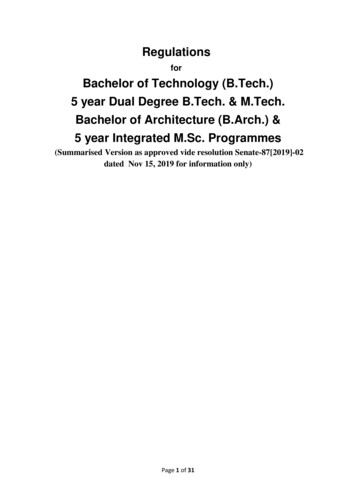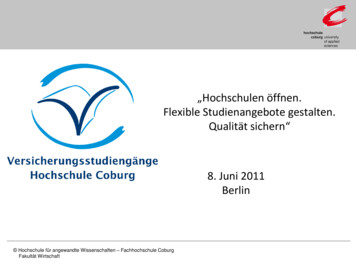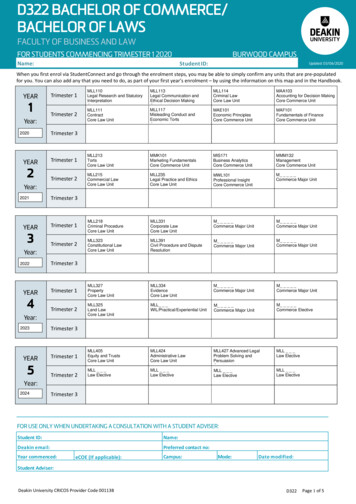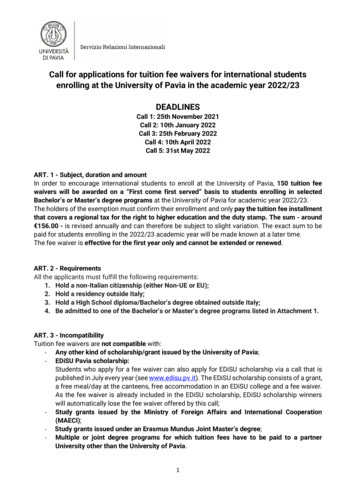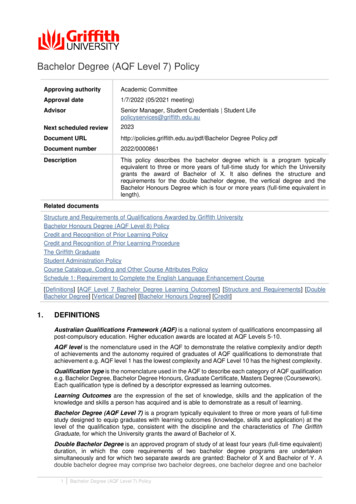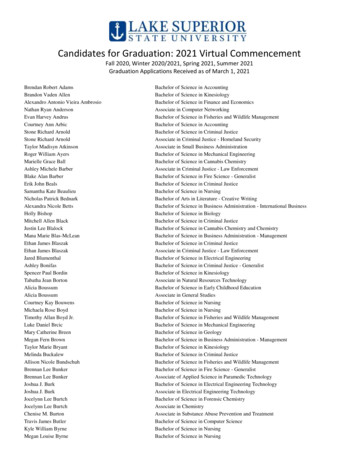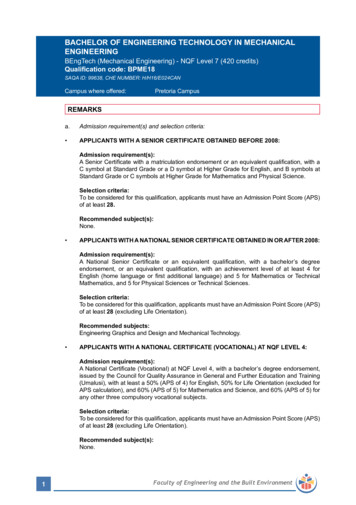
Transcription
BACHELOR OF ENGINEERING TECHNOLOGY IN MECHANICALENGINEERINGBEngTech (Mechanical Engineering) - NQF Level 7 (420 credits)Qualification code: BPME18SAQA ID: 99638, CHE NUMBER: H/H16/E024CANCampus where offered:Pretoria CampusREMARKSa.Admission requirement(s) and selection criteria: APPLICANTS WITH A SENIOR CERTIFICATE OBTAINED BEFORE 2008:Admission requirement(s):A Senior Certificate with a matriculation endorsement or an equivalent qualification, with aC symbol at Standard Grade or a D symbol at Higher Grade for English, and B symbols atStandard Grade or C symbols at Higher Grade for Mathematics and Physical Science.Selection criteria:To be considered for this qualification, applicants must have an Admission Point Score (APS)of at least 28.Recommended subject(s):None. APPLICANTS WITH A NATIONAL SENIOR CERTIFICATE OBTAINED IN OR AFTER 2008:Admission requirement(s):A National Senior Certificate or an equivalent qualification, with a bachelor’s degreeendorsement, or an equivalent qualification, with an achievement level of at least 4 forEnglish (home language or first additional language) and 5 for Mathematics or TechnicalMathematics, and 5 for Physical Sciences or Technical Sciences.Selection criteria:To be considered for this qualification, applicants must have an Admission Point Score (APS)of at least 28 (excluding Life Orientation).Recommended subjects:Engineering Graphics and Design and Mechanical Technology. APPLICANTS WITH A NATIONAL CERTIFICATE (VOCATIONAL) AT NQF LEVEL 4:Admission requirement(s):A National Certificate (Vocational) at NQF Level 4, with a bachelor’s degree endorsement,issued by the Council for Quality Assurance in General and Further Education and Training(Umalusi), with at least a 50% (APS of 4) for English, 50% for Life Orientation (excluded forAPS calculation), and 60% (APS of 5) for Mathematics and Science, and 60% (APS of 5) forany other three compulsory vocational subjects.Selection criteria:To be considered for this qualification, applicants must have an Admission Point Score (APS)of at least 28 (excluding Life Orientation).Recommended subject(s):None.1Faculty of Engineering and the Built Environment
APPLICANTS WITH A NATIONAL N CERTIFICATE/NATIONAL SENIOR CERTIFICATE ASPUBLISHED IN REPORT 191: N3 (NQF LEVEL 4):Admission requirement(s):A National Senior Certificate or a National N Certificate with languages as published inReport 191: N3 (NQF Level 4) issued by both the Department of Higher Education and Training(DHET) and the Council for Quality Assurance in General and Further Education and Training(Umalusi), with at least 50% for English, Mathematics N3, Engineering Sciences N3 and anyother two additional subjects.Selection criteria:To be considered for this qualification, applicants must have an Admission Point Score (APS)of at least 28.Recommended subject(s):None. APPLICANTS WITH A N6 CERTIFICATE IN A RELATED ENGINEERING FIELD AS PUBLISHED IN REPORT 191: N6:Admission requirement(s):A N6 Certificate in a related Engineering field as published in Report 191: N6 issued byboth the Department of Higher Education and Training (DHET) and the Council for QualityAssurance in General and Further Education and Training (Umalusi), with an average of atleast 60% for the qualification, and successful completion of an English Language ProficiencyAssessment (done by the University).Recommended subject(s):None. APPLICANTS WITH QUALIFICATIONS ON THE HIGHER EDUCATION QUALIFICATIONSUB-FRAMEWORK (HEQSF) OFFERED BY UNIVERSITIES OF TECHNOLOGY:The applicant will be considered for admission to the programme, if any of the followingqualifications has been completed:- Higher Certificate in Mechanical Engineering (NQF Level 5 - 140 credits): an average ofat least 60% for the qualification, and 60% in each of the following modules: EngineeringGraphics, Engineering Physics, Mechanics and Technical Mathematics.- Advanced Certificate in Mechanical Engineering (NQF Level 6 - 140 credits): an averageof at least 60% for the qualification.- Diploma in Mechanical Engineering Technology (NQF Level 6 - 280 credits): an averageof at least 55% for the qualification.- National Diploma: Engineering: Mechanical (NQF Level 6 - 3,000 credits): an averageof at least 55% for the qualification.b.Assessment procedure(s):No further assessment will be done (except for candidates with a N4 Certificate). Applicantswho achieve the minimum APS will be considered until the programme complement is full. Allcompleted applications received within the published due dates will be ranked. After considerationof the Departmental Student Enrolment Plan, only the top ranking applicants will be selected.Once a programme is full, a waiting list will be in place to provide an opportunity for applicantsto fill places of those who did not register on time. Applicants will be informed of their statusper official letter from the Office of the Registrar, alternatively, they can check their applicationstatus on the TUT website, www.tut.ac.za.Applicants who do not meet the minimum requirements, might be transferred to the HigherCertificate in Mechanical Engineering, provided that he/she meets the minimum requirements.2Faculty of Engineering and the Built Environment
c.Recognition of Prior Learning (RPL), equivalence and status:See Chapter 30 of Students’ Rules and Regulations.d.Intake for the qualification:January only.e.Presentation:Day classes.f.Minimum duration:Three years.g.Exclusion and readmission:See Chapter 2 of Students' Rules and Regulations.CURRICULUMFIRST 05BEMA105BINL125CComputer LiteracyCommunication SkillsEngineering GraphicsElectrical CircuitsEngineering Mathematics IInformation Literacy (blockmodule)Life Skills (block EQUISITE MODULE(S)FIRST SEMESTERMAN115BManufacturing ISECOND SEMESTERSOM115BStrength of Materials ITOTAL CREDITS FOR THE FIRST YEAR:140SECOND YEARCODEMODULENQF-LCREDITDOM206B Design of Machines(6)(28)EMA206B Engineering Mathematics II(6)(14)EMT206B Engineering Materials(6)(14)FLM207B Fluid Mechanics(7)(28)PAS206B Probability and Statistics(6)(14)THE207B Thermodynamics(7)(28)PREREQUISITE MODULE(S)Engineering Mathematics IMechanicsEngineering Mathematics IManufacturing IEngineering Mathematics IMechanicsEngineering Mathematics IEngineering Mathematics IFIRST SEMESTERSCP216BScientific Computing(6)TOTAL CREDITS FOR THE SECOND YEAR:3(14)140Faculty of Engineering and the Built Environment
THIRD YEARCODEMODULENQF-LCREDITMEP307B Mechanical Design Projects(7)(28)SOM307B Strength of Materials II(7)(28)PREREQUISITE MODULE(S)Design of MachinesEngineering MaterialsEngineering Mathematics IIProbability and StatisticsScientific ComputingStrength of Materials IFIRST SEMESTERCMH316B Control of Machines(6)(14)EPE316B Electrical Power Engineering(6)(14)MAN317B Manufacturing II(7)(14)Engineering Mathematics IIElectrical CircuitsEngineering MaterialsEngineering Mathematics IManufacturing ISECOND SEMESTERDYN317B Dynamics(7)(14)EPR317B Engineering Practice(7)(14)HTR317B Heat Transfer(7)(14)Engineering Mathematics IMechanicsEngineering Mathematics IIFluid MechanicsThermodynamicsTOTAL CREDITS FOR THE THIRD YEAR: 140TOTAL CREDITS FOR THE QUALIFICATION: 420MODULE INFORMATION (OVERVIEW OF SYLLABUS)The syllabus content is subject to change to accommodate industry changes. Please note that a more detailedsyllabus is available at the Department or in the study guide that is applicable to a particular module. At timeof publication, the syllabus content was defined as follows:CCOMMUNICATION SKILLS (COS105X)1 X 2-HOUR PAPER(Module custodian: Department of Chemical, Metallurgical and Material Engineering)To identify and apply basic competencies related to communicating in a technical or engineering environment.These competencies include presenting technical information to a variety of audiences, preparing technicalreports, participating constructively in formal meetings and preparing a variety of business and technicaldocuments. (Total notional time: 60 hours)COMPUTER LITERACY (COL105X)CONTINUOUS ASSESSMENT(Module custodian: End User Computing Unit)This module provides foundational knowledge in computing fundamentals, essential digital skills in keyapplications based on MS Office Suite and network basics (i.e. MS Outlook and Internet). Online exams aremapped with End-User Computing: SAQA 49077 (61591) Core Element as well as Internet and ComputingCore Certification. (IC3). (Total notional time: 50 hours)4Faculty of Engineering and the Built Environment
CONTROL OF MACHINES (CMH316B)1 X 3-HOUR PAPER(Module custodian: Department of Mechanical and Mechatronics Engineering)To equip the student with a fundamental understanding of electro pneumatics and hydraulics and its associated control systems in an industrial setting. (Total notional time: 140 hours)DDESIGN OF MACHINES (DOM206B)1 X 3-HOUR PAPER (PRESCRIBED OPEN BOOK)(Module custodian: Department of Mechanical and Mechatronics Engineering)To develop the advanced knowledge and understanding of the student in the process of problem assessmentand design. At the end of this module, provided that the student has completed all tutorials, assignments andpresentations successfully, the student will have a theoretical and practical understanding and knowledge ofproblem definition, design, communication and computer skills, use of engineering science and knowledge,and can undertake advanced tasks related to the design of components, assemblies and related equipment.(Total notional time: 280 hours)DYNAMICS (DYN317B)1 X 3-HOUR PAPER(Module custodian: Department of Mechanical and Mechatronics Engineering)The purpose of this module is to equip the student with a foundational framework of dynamics. A large sectionof this module deals with “vibration” which is a sub-discipline of dynamics and deals with repetitive motion. Inmost mechanical systems and structures, vibration is unwanted and even destructive. The task of this unit isto teach the student how to analyse vibration, using principles of dynamics. The concepts and formulationspresented in this module are intended to provide the skills needed for designing vibration systems with desiredproperties that enhance vibration when it is wanted and reduce vibration when it is unwanted. (Total notionaltime: 140 hours)EELECTRICAL CIRCUITS (ELC105B)1 X 3-HOUR PAPER(Module custodian: Department of Electrical Engineering)Direct current circuits. Magnetism and electromagnetism. Single phase alternating current systems. Activecomponents in electric circuits. Alternating current with passive and active components in electric circuits.Three-phase alternating current systems. (Total notional time: 280 hours)ELECTRICAL POWER ENGINEERING (EPE316B)1 X 3-HOUR PAPER(Module custodian: Department of Electrical Engineering)To provide an understanding of the use of electrical power in the working of machines and drives. (Totalnotional time: 140 hours)ENGINEERING GRAPHICS (EGE105B)CONTINUOUS ASSESSMENT(Module custodian: Department of Mechanical and Mechatronics Engineering)Introduction to graphics communication. Dimensioning and tolerance practices. Geometrical construction.Orthographic projections. Machine drawing and introduction to computer aided design and Assemblies. (Totalnotional time: 140 hours)ENGINEERING MATERIALS (EMT206B)1 X 3-HOUR PAPER(Module custodian: Department of Mechanical and Mechatronics Engineering)To equip the student with a fundamental understanding of how Engineering Materials are Processed andutilised in design problem. The module will give an overview of the fundamentals of engineering materials,processing techniques, properties and how each process interrelates with the other phases of manufacturingprocesses. (Total notional time: 140 hours)ENGINEERING MATHEMATICS I (EMA105B)2 X 2-HOUR PAPERS(Module custodian: Department of Mathematics and Statistics)Trigonometry, geometry, functions, complex numbers, vector algebra, matrices and transformations, singlevariable differentiation and integration, partial differentiation, multiple-variable intervals, introduction to differentialequations. (Total notional time: 280 hours)5Faculty of Engineering and the Built Environment
ENGINEERING MATHEMATICS II (EMA206B)1 X 3-HOUR PAPER(Module custodian: Department of Mathematics and Statistics)Mathematical modelling, first-order ordinary differential equations (ODEs), higer-order ODEs, Laplacetransforms, systems of ODE's, numerical solutions of ODEs, Sturm-Liouville problems, partial differentialequations. (Total notional time: 140 hours)ENGINEERING PRACTICE (EPR317B)CONTINUOUS ASSESSMENT(Module custodian: Department of Electrical Engineering)To prepare the student to effectively plan and execute projects. Write quality technical reports and communicate all project information to peers. (Total notional time: 140 hours)FFLUID MECHANICS (FLM207B)1 X 3-HOUR PAPER(Module custodian: Department of Mechanical and Mechatronics Engineering)To equip the student with a fundamental understanding of fluid statics and fluid dynamics principles and howto apply the same in solving practical problems in various aspects of fluid mechanics. (Total notional time:280 hours)HHEAT TRANSFER (HTR317B)1 X 3-HOUR PAPER(Module custodian: Department of Mechanical and Mechatronics Engineering)A comprehensive introduction to the rates of thermal energy systems for students in mechanical engineering.It is designed to give students a necessary foundation for a comprehensive understanding of rate of transferof thermal energy in energy systems. (Total notional time: 140 hours)IINFRMATION LITERACY (INL125C)CONTINUOUS ASSESSMENT(Module custodian: Directorate of Library and Information Services)Introduction of information literacy. Development of a search strategy and application of a search string to searchengines and academic databases. Evaluation of information sources. Ethical and legal use of information.(Total notional time: 10 hours)LLIFE SKILLS (LFS125X)CONTINUOUS ASSESSMENT(Module custodian: Directorate of Student Development and Support)Personal, socio-emotional and academic skills development for students in higher education. This module includes 1. Intra- and interpersonal skills (e.g. emotional intelligence, relationships, and conflict management);2. General study skills (e.g. time management, goal setting, learning styles); 3. Health and wellness (e.g. HIV/AIDS, GBV issues, substance abuse); 4. Student life and adjustment (e.g. identity development, adjusting to ahigher education environment); and 5. Financial management. (Total notional time: 20 hours)MMANUFACTURING I (MAN115B)1 X 3-HOUR PAPER(Module custodian: Department of Mechanical and Mechatronics Engineering)To equip the student with a fundamental understanding of mechanical manufacturing materials and processesand how to apply these to a design problem. (Total notional time: 140 hours)MANUFACTURING II (MAN317B)1 X 3-HOUR PAPER(Module custodian: Department of Mechanical and Mechatronics Engineering)To develop a broad-based knowledge and understanding of the student in the field of Tooling. (Total notionaltime: 140 hours)MECHANICAL DESIGN PROJECTS (MEP307B)CONTINUOUS ASSESSMENT(Module custodian: Department of Mechanical and Mechatronics Engineering)To develop the advanced knowledge and understanding of the student in the process of problem assessmentand design. (Total notional time: 280 hours)6Faculty of Engineering and the Built Environment
MECHANICS (MEC105B)1 X 3-HOUR PAPER(Module custodian: Department of Mechanical and Mechatronics Engineering)To equip the student with a fundamental understanding of mechanics and how to apply these to a designproblem. (Total notional time: 280 hours)PPROBABILITY AND STATISTICS (PAS206B)1 X 3-HOUR PAPER(Module custodian: Department of Mathematics and Statistics)Sampling techniques and descriptive statistics. Probability. Counting rules. Inferential statistics. Analysis ofvariance. Regression and correlation analysis. Non-parametric tests. (Total notional time: 140 hours)SSCIENTIFIC COMPUTING (SCP216B)CONTINUOUS ASSESSMENT(Module custodian: Department of Electrical Engineering)Scientific computing and programming environment. Fundamentals of programming: Selection and loop statements. Use-defined functions. Input, output and graphics. Engineering application case studies and simulations.(Total notional time: 140 hours)STRENGTH OF MATERIALS I (SOM115B)1 X 3-HOUR PAPER(Module custodian: Department of Mechanical and Mechatronics Engineering)To provide a thorough foundation to the behaviour of materials under the action of external forces as requiredat higher levels of study and for the purpose of economically designing machine components. (Total notionaltime: 140 hours)STRENGTH OF MATERIALS II (SOM307B)1 X 3-HOUR PAPER(Module custodian: Department of Mechanical and Mechatronics Engineering)To provide a sound foundation in the study of Mechanical of Materials advanced knowledge to the behaviourof materials under the action of external forces as required at higher levels of study and for the purpose ofeconomically designing Machine Components. (Total notional time: 280 hours)TTHERMODYNAMICS (THE207B)1 X 3-HOUR PAPER(Module custodian: Department of Mechanical and Mechatronics Engineering)To equip the student with a fundamental understanding of the principles of thermodynamics and how thesefundamentals are applied in the design and analysis of thermo-fluid systems. (Total notional time: 280 hours)7Faculty of Engineering and the Built Environment
Graphics, Engineering Physics, Mechanics and Technical Mathematics. - Advanced Certificate in Mechanical Engineering (NQF Level 6 - 140 credits): an average of at least 60% for the qualification. - Diploma in Mechanical Engineering Technology (NQF Level 6 - 280 credits): an average of at least 55% for the qualification.
